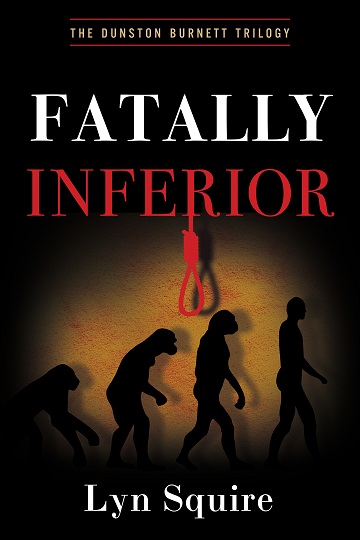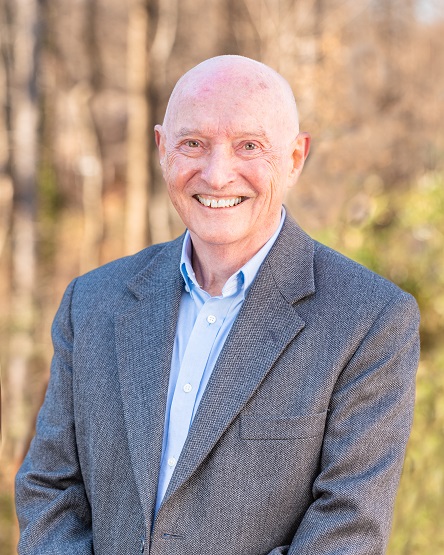I am a huge fan of the mysteries produced during the Golden Age of Crime in the 1920s and 30s, and especially the attention to plot evident in all these books, something I try to carry over into my own writing.
Lyn Squire – 12 December 2024
The Back Flap
A diabolical tale of retribution cast against the greatest debate of its time.
Darwin’s theory of evolution is the fascinating background for this tragic story of seemingly unrelated events.
Award-winning author Lyn Squire has done it again with an extraordinary follow-up to Immortalised to Death. Set in Victorian England amidst the furor triggered by Charles Darwin’s revolutionary theory, Fatally Inferior plunges Dunston Burnett, the series’ unassuming but sometimes insightful amateur sleuth, into a cauldron churning with secrets and lies. An abduction—the victim mysteriously vanishing from a locked-tight country house. A birth—the newborn torn from its mother’s arms. These seemingly independent incidents converge in a vile act of vengeance: a hellish torture for the victim; the perfect revenge for the perpetrator. Will Dunston ever be able to expose the heart of this dark, confounding mystery?
About the book
What is the book about?
Fatally Inferior, the second book in The Dunston Burnett Trilogy, is a story of retribution set against the backdrop of the uproar triggered in Victorian England by Charles Darwin’s theory of evolution. In this novel, Dunston must contend with the abduction of a member of Darwin’s family, the missing person inexplicably spirited out of a locked-tight country house. A few days later, a ransom demand arrives at Down House, Darwin’s home in Kent, threatening that the hostage will be killed unless Darwin renounces his theory in The Times. Meanwhile, a former maid at Down House dies, or so it seems, giving birth in London’s Shoreditch workhouse. Believing her dead, her baby son is swiftly dispatched to a hell-hole orphanage in Hampshire. These apparently independent events converge in a vile act of vengeance: a hellish torture for the victim; the perfect revenge for the perpetrator.
When did you start writing the book?
I started writing the book in 2020, shortly after completing an initial full draft of Immortalised to Death, the first book in the trilogy.
How long did it take you to write it?
I spent four years researching, writing, re-writing and polishing Fatally Inferior.
Where did you get the idea from?
Charles Darwin. When I read a biography of him, two aspects of his life jumped out at me.
One arose from the furor that greeted the publication of The Origin of Species. Darwin was immediately bombarded with scathing reviews, blistering editorials, and crude cartoons. This avalanche of disgust and hatred from believers in God’s creation of man, led me to imagine a more malicious assault on the scientist. The other had to do with the blood relationship between Darwin and his wife; they were first cousins. In the nineteenth century, the offspring of marriages between such close relatives were thought to suffer loss of vigor and infertility. This brought to mind an image of a couple desperate for a grandchild only to be cruelly robbed of this happy outcome by a vile act of revenge. Thanks to Darwin, I had two pegs on which to hang my story.
Were there any parts of the book where you struggled?
The hardest part was finding the idea(s) to motivate the story. The idea for Immortalised to Death was firmly fixed in my mind before I started to write. In fact, the idea – a solution to Charles Dicken’s unfinished Mystery of Edwin Drood — was what prompted me to write the first book. When I sat down to write Fatally Inferior, I realized I had no clue what the story was to be about. It was only after much bibliographical research that I happened on the Darwin biography and the two aspects of his life that provided the structural foundations for my book.
What came easily?
That I had finished the first story in the trilogy helped me enormously in writing the second. I had already researched Victorian dress, furniture, architecture, vernacular, patterns of everyday behavior and so on for the first book, so all this material was immediately available for the second book. Similarly, Dunston Burnett, my protagonist, was fully described when he first enters the story in Immortalised to Death so his presence in book two did not entail the need for additional research. Finally, the theme for the series – the tension between Dunton’s limitations as a detective and the complexity of the mysteries confronting him – was well established.
Are your characters entirely fictitious or have you borrowed from real world people you know?
All the main and secondary characters are fictitious with the exceptions of Charles Darwin and his wife, Emma. While they make only fleeting appearances in Fatally Inferior, Darwin’s life and times frame and drive the entire story.
We all know how important it is for writers to read. Are there any particular authors that have influenced how you write and, if so, how have they influenced you?
I am a huge fan of the mysteries produced during the Golden Age of Crime in the 1920s and 30s, and especially the attention to plot evident in all these books, something I try to carry over into my own writing. Turning to more recent authors, the one book I wish I had written myself is The Pale Blue Eye by Louis Bayard. This tale of revenge set in 1830s West Point has an ingenious plot with a breathtaking twist at the end. The prose is wonderfully evocative, and the story features a young Edgar Allan Poe as a major supporting character. Perfect, everything I strive for in my own novels.
Do you have a target reader?
My books are aimed at readers of mysteries and readers of historical novels.
About Writing
Do you have a writing process? If so can you please describe it?
I usually write first thing in the morning. I like to get a rough draft on paper and then review and edit over several days. I spend a lot of non-writing time (including in bed) thinking about my story so that when I next sit at my computer, I have a clear idea of what I want to say even to the specific words for the opening sentence.
Do you outline? If so, do you do so extensively or just chapter headings and a couple of sentences?
I have a full, detailed outline in hand before I start writing. I will modify and adapt the outline as I go if necessary, but not the basic plot.
Do you edit as you go or wait until you’ve finished?
Both. I definitely spend time editing each chapter before I consider it an acceptable draft. But then, when the story is complete, I edit the whole text from start to finish. Coming back to the novel in this way invariably results in more re-drafting and, I believe, significant improvements in word choice, grammar and flow.
Did you hire a professional editor?
I hired a professional editor both to help with the basic structure of the novel and to copy-edit.
Do you listen to music while you write? If yes, what gets the fingers tapping?
I do like to listen to music while I write. I mostly listen to rock and roll (anything from the Beatles and the Beach Boys on) but at a low volume.
About Publishing
Did you submit your work to Agents?
Yes, many. I suffered through a soul-destroying round of rejections before I managed to find an agent who liked my story.
What made you decide to go Indie, whether self-publishing or with an indie publisher? Was it a particular event or a gradual process?
It was a gradual process involving many failed attempts before I finally landed a publisher.
Did you get your book cover professionally done or did you do it yourself?
My covers are professionally designed although I always make significant input both on concept and detail.
Do you have a marketing plan for the book or are you just winging it?
The marketing plan for my book is prepared and executed by a professional publicist. I have control over the process but the publicist guides me with many suggestions and executes the plan.
Any advice that you would like to give to other newbies considering becoming Indie authors?
I was new to writing and to the publishing business, and found it extremely useful to have professional support for editing, cover design and marketing. Those authors more experienced than I, may feel more comfortable handling everything, or various parts of the process, themselves. I would encourage everyone else to get as much help as they think they need.
About You
Where did you grow up?
In a seaside town in South Wales, UK.
Where do you live now?
Virginia.
What would you like readers to know about you?
I am an economist by training, but after my first novel, I was bitten by the writing bug and am now a full-time writer.
What are you working on now?
I am completing the third book in The Dunston Burnett Trilogy. The Séance of Murder is a story of greed set against the spiritualist movement that swept through Victorian England in the late 19th century. It will be released in 2026.
End of Interview:
Get your copy of Fatally Inferior from Amazon US or Amazon UK.


